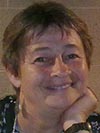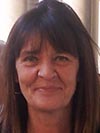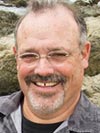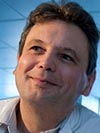
6th Bilateral Seminar Italy-Japan
&
2nd Marine NanoEcoSafety Workshop
Palermo, Italy, 17-20 November 2014

Invited Speakers' Biosketches
Maria Byrne (Sydney, NSW, Australia)

Dr. Maria Byrne is the Professor of Marine and Developmental Biology at the University of
Sydney, Australia. Prof. Byrne obtained her bachelors degree from the National University of
Ireland, Galway and her doctorate from the University of Victoria, Canada. This was followed
by postdoctoral positions at the Smithsonian Marine Station in Florida and back at NUIG.
Research in the Byrne Laboratory investigates the biology of marine and freshwater
invertebrates with a focus on the Echinodermata and the Mollusca. Current projects involve
species from tropical and temperate Australia. Using a multidisciplinary approach we
addresses major paradigms in evolution, development and biology. She is currently Director
One Tree Island Research Station of The University of Sydney.
Representative web link.
![]()
Laura Canesi (Genoa, Italy)

1984: Degree in Natural Sciences, Genoa University; 1989: Ph.D in Marine Environmental
Sciences, Genoa University; 1994-1998: Researcher at the Faculty of Pharmacy, Urbino
University; 1998-2005: Associate Professor of Physiology at the Faculty of Environmental
Sciences, Urbino University; 2005- present: Associate Professor at the Faculty of Sciences
(now School of Sciences) of the Genoa University. The scientific activity has mainly
concerned the physiological responses of marine organisms, from cellular to organism level, to
both endogenous and environmental stimuli, utilizing as a prevalent model organism the
bivalve Mytilus. The study of the responses to environmental stressors in marine mussels
enlightened different mechanisms involved in the physiological regulation of functions by
extracellular signals at the cellular and tissue level. Basic knowledge on the physiology of
these organisms and the possibility to evaluate their health status in different environmental
conditions allowed for the participation in the last few years to both national and European
research projects.
Representative web link.
![]()
Gary N. Cherr (Bodega Bay, CA, USA)

Ph.D. Zoology, University of California. Dr. Cherr’s laboratory investigates cell functioning
during fertilization and early development in marine and estuarine organisms, and the effects
of pollutants and environmental stressors. The systems utilized in the laboratory include
gametes and embryos from algae, molluscs, echinoderms, and fishes. Since these systems
exhibit temporally and mechanistically distinct cellular events during development, they can be
used to discern the mode of action of pollutants at the subcellular levels. A major emphasis is
placed on the effects of pollutants on cytoskeletal dynamics, intracellular ion activities, and
cell-extracellular matrix interactions during fertilization and development. The laboratory is
also involved in isolation and identification of pollutants in complex mixtures and investigates
structure/function relationships of the pollutants using the above biological systems. Dr. Cherr
is Chair of the State of Washington Biomonitoring Science Advisory Board, and is on the State
of California’s Marine Bioassay Protocol Review Committee. He is currently Director of the
Bodega Bay Marine Laboratory.
Representative web link.
![]()
Richard Handy (Plymouth, United Kingdom)

Richard is a Professor of Environmental Toxicology at The University of Plymouth and
Director of the Ecotoxicology Research and Innovation Centre at the
University,http://www.plymouth.ac.uk/research/eric . He did his PhD on fish ecotoxicology
and trace metal physiology at the University of Dundee, under the supervision of Brian Eddy
and stayed at Dundee as a NERC fellow working on trace metals, before further post-doctoral
positions at Heriot-Watt and then Edinburgh University. He moved to Plymouth in 1996, and
has maintained interests in the fundamental biology of trace metal homeostasis and
osmoregulation in animals, including humans. The ecotoxicology aspect is a strength of his
laboratory, and recognises that environmental pollution, as well as changes in environmental
chemistry generally, can alter the physiology of animals; and if this goes unchecked it will lead
to poor health of the organisms and physiological dysfunction. Richard is interested in
mechanistic aspects of ecotoxicology, and works mainly on fishes that lend themselves to such
whole organism biology. His laboratory also uses a range of in vitro models, and comparative
aspects with mammals/humans. He is also an experienced animal welfare officer, interested in
diagnostics and tools like histopathology to measure organism health.
Representative web link.
![]()
Jérôme Labille (Aix-en-Provence, France)

Dr Jérôme Labille has a Ph.D. in Environmental geosciences. He is a research Scientist at
French National Scientific Research Center CNRS. His researches in CEREGE lab (Aix en
Provence, France) concern the physical behaviour in aqueous environment of sub-micrometric
particles from natural or anthropic origin. He is expert in the dynamic of aggregation,
dispersion and deposition of natural colloids and manufactured nanoparticles in aquatic
systems and in saturated porous media. His current researches focus mainly on the interfacial
physicochemical mechanisms that govern the release, fate and exposure of manufactured
nanoparticles in the environment through the lifecycle of the related nano-products. In 2007-
2009 Dr. J. Labille coordinated the French Research Program EC2CO NANOALTER “Aging
of commercialised nanomaterials. Fate and toxicity of the byproducts.” Since 2008, he has
been a member of the International Consortium for the Environmental Implications of
Nanotechnology (GDRI iCEINT). Since 2012, He has been a member of the steering
Committee of the French LabEx SERENADE which stands for Laboratory of Excellence for
Safe(r) Ecodesign Research and Education applied to NAnomaterial DEvelopment. Since
2013, Dr J. Labille coordinates the FP7 ERA-NET SIINN program NANOHETER “Fate of
engineered nanoparticles in the water column under natural conditions. Role of the
heteroaggregation with naturally occurring suspended matter”.
Representative web link & link.
![]()
Heather Leslie (Amsterdam, Netherlands)

PhD in Zoology, Oregon State University, Dissertation title: Advancing the science of marine
reserves: From field experiments to tools for marine conservation planning.
Peggy and Henry D. Sharpe Assistant Professor of Environmental Studies and Biology
Department of Ecology and Evolutionary Biology & Institute for the Study of Environment
and Society Brown University. Dr. Heather Leslie is a leading expert in the field of marine
litter and microplastics. From her background in ecotoxicology and analytical chemistry she
explores interdisciplinary approaches to studying complex environmental pollution problems
such as marine litter, collaborating with social scientists and engaging stakeholders such as
policy makers and businesses. Heather's research includes analytical method development for
the plastic particulate fraction of marine litter and understanding the sources and impacts of
plastic micro- and nano-particulates on the marine environment. She is the coordinator of the
FP7 project CleanSea (www.cleansea-project.eu)
Representative web link.
![]()
Niall McDonough (Oostende, Belgium)

Niall McDonough (PhD 1998) originally trained as a marine biologist, with research interests
in aquaculture, fisheries and marine resource management. He has previously held
management roles with the Environmental Change Institute at NUI Galway (Ireland), the
Centre for Marine Resources and Mariculture at Queens University Belfast (UK), and with the
Irish Marine Institute. As Head of the Marine Board Secretariat, Niall oversees the
implementation of all Marine Board strategic activities and projects, including management of
the Secretariat staff and the Marine Board budget. Niall represents the Board in external panels
and has responsibility to communicate with major European and international partners. He is
Series Editor of the European Marine Board Position Papers.
Representative web link.
![]()
Please wait... Checking Javascript functionality

If you continue to see this sentence for more than 20 seconds,
please enable Javascript in your browser.
The advanced functionality of this site depends on Javascript. We are sorry, but the contents of this page cannot be displayed by your browser in its current state.
For instructions on how to activate Javascript in your browser, you may try this link (you will be re-directed to a website not associated with Azuleon but, last time we checked, the instructions there were clear and accurate).
For any further assistance, please contact the Azuleon webmaster.

